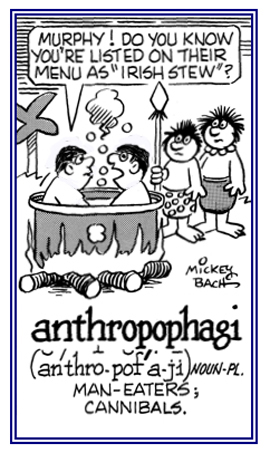androphagous
The eating of a man (as opposed to a woman); similar to anthropophagus (cannibalism).
anthophagous, anthophagy
1. Feeding on flowers.
2. The eating or consumption of flowers.
anthropophagic
(adjective), more anthropophagic, most anthropophagic
Characterized by or relating to the consumption of humans; such as, a cannibal.
anthropophagist
(s) (noun), anthropophagists
(pl)
A habitual cannibal or someone who eats human flesh.
anthropophagistic
(adjective), more anthropophagistic, most anthropophagistic
Referring to, or characterized by, being eaters of human beings.
anthropophagite
(s) (noun), anthropophagites
(pl)
Someone who eats human flesh; a cannibal.
anthropophagous
(adjective), more anthropophagous, most anthropophagous
1. A reference to those who eat human flesh.
2. Descriptive of eating human beings, being canibalistic.
anthropophagously
(adverb), more anthropophagously, most anthropophagously
Relating to the consumption or eating of people.
anthropophagus
(s) (noun), anthropophagi
(pl)
1. An individual who eats the flesh of other human beings; cannibalism: In the legend Grace was reading, a group of
anthropophagi, who were seemingly mortals, were trying to catch lost people on the island to have for their dinner!
2. Etymology: the word
cannibal comes from Spanish
canibal, "a savage, cannibal"; from , "brave men".
The natives were believed to be anthropophagites. Columbus, seeking evidence that he was in Asia, thought the name meant the natives were subjects of the Great Khan.
Cannibalism also refers to an animal that eats the flesh of other animals of the same species.
 © ALL rights are reserved.
© ALL rights are reserved.
Go to this Word A Day Revisited Index
so you can see more of Mickey Bach's cartoons.
anthropophagy
(s) (noun), anthropophagies
(pl)
The eating, or the consumption, of humans by other people; cannibalism.
aphagia
(s) (noun), aphagias
(pl)
1. Abstention from eating: The prisoner announced that he was beginning an aphagia to protest his imprisonment and was refusing to eat.
2. The inability to swallow or failure to eat or swallow because it causes too much pain: Because of an injury to her throat, Tracy was experiencing severe aphagia and was unable to swallow food or liquids.
aphagopraxia
(s), aphagopraxias
(pl) (nouns)
The loss of the ability to swallow: "The ailment of aphagopraxia may be caused by the narrowing of the esophagus as a result of a physical ailment; such as, cancer or injury."
"Aphagopraxia is also defined as a disturbance to the nervous control of the swallowing mechanism by a stroke or some kind of motor neurone disease."
aphagosis
The inability to eat; not eating.
Referring to the consumption of spiders: Many birds, reptiles, fish, centipedes, scorpions, and even other spiders are arachnophagous animals that eat spiders!
Referring to an organism that feeds on spiders: Araneophagic animals, which are spider predators, can be lizards, birds, tarantula hawks, or other spiders.
Related "eat, eating" word units:
brycho-;
esculent-;
esophago-;
glutto-;
vor-.
Cross references of word families that are related directly, or indirectly, to: "food, nutrition, nourishment":
alimento-;
broma-;
carno-;
cibo-;
esculent-;
sitio-;
tropho-;
Eating Crawling Snacks;
Eating: Carnivorous-Plant "Pets";
Eating: Folivory or Leaf Eaters;
Eating: Omnivorous.

If you would like to take self-scoring quizzes over some of the words in this thematic unit, then click
Phago Quizzes, so you can evaluate your knowledge about some of these
"eat, eating" words.



